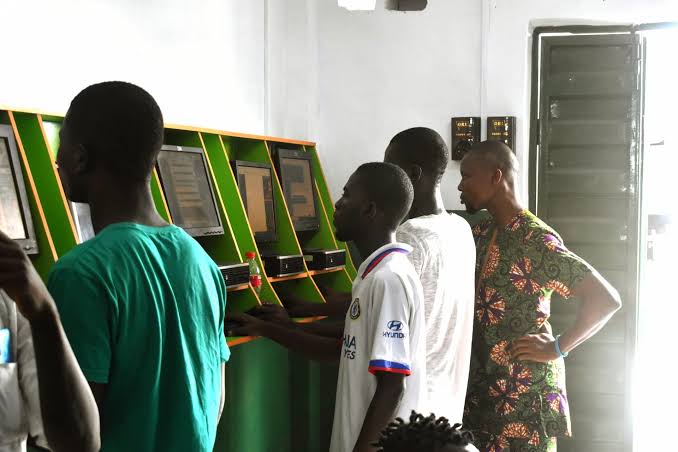The Supreme Court has nullified the National Lottery Act 2005 enacted by the National Assembly.
The apex court said it was made in violation of the powers bestowed on the federal legislature by the Constitution.
Some senior lawyers have, however, commended the court for what they described as a landmark judgement. and a game changer in the country and the sector
According to them, the judgement will further enrich jurisprudence in the country.
A Senior Advocate of Nigeria, Mr Abdul Balogun, applauded the Supreme Court for the bold judgement saying, the respective parties would go back and do the right thing.
He said, “The Supreme Court should be commended for this bold judgement. As it is now, the wrong in our laws have been corrected and all the parties involved can now go back and do the right thing.
“No doubt, it is a landmark judgement and it will be remembered for a long time.”
Constitutional lawyer, Barrister Seidu Bello, said with the judgement, the country’s jurisprudence will be further enriched. According to him, the judgement will be a defence point for a long time.
“As far as the judgement of the Supreme Court is concerned, that is the position of the law regarding lottery regulation in Nigeria. With this, our jurisprudence is further enriched,” he said.
In a unanimous judgment, a seven-member panel of the apex court, held that the National Assembly lacked the powers to legislate on issues relating to lottery and games of chance.
The court held that such powers only reside with the state Houses of Assembly which possess exclusive jurisdiction over lottery and related issues.
In the lead judgment delivered by Justice Mohammed Idris, the court resolved the two issues raised for determination against the Attorney General of the Federation (AGF) and one other listed as defendants.
He granted all the reliefs sought by the plaintiffs. The judgment was on the suit, marked: SC/1/2008 filed by Lagos and some other states.
Justice Idris ordered that the National Lottery Act 2005 should no longer be applied in all states, except the Federal Capital Territory (FCT), in respect of which the National Assembly is empowered to make laws.
He declared that lottery or games of chance is not one of the items on the exclusive legislative list contained in the Constitution in respect of which the National Assembly has the powers to make laws for the whole of the country.
The judge also declared that having regard to the clear provisions of Section 4(2) & (3) of the Constitution, the National Assembly lacks the powers to make any legislation for the control and regulation of lottery in Nigeria.
He equally declared that having regard to the provisions of Section 4(4)(a) & (b) and Part 2 of the Second Schedule of the Constitution, matters relating to lottery are not issues on which the National Assembly and state Houses of Assembly have concurrent powers to make laws.
Justice Idris also declared that having regard to the provisions of Section 4(7)(a) & (c) of the First Schedule to the Constitution the House of Assembly of Lagos State and other states have the powers, to the exclusion of the National Assembly, to make laws for the regulation and control of lottery within their states.
He further declared that having regards to the provisions of sections 4(4)(b), 7(a) and 39, 29(9)(a) of the Constitution, the power of the National Assembly to make laws for the regulation and control of lottery is limited by the Constitution.
The judge also declared that sections 17, 18, 19 and 20 and 21 of the National Lottery Act 2005 made by the National Assembly are inconsistent with the Constitution, adding that the National Lottery Act is inconsistent with the provisions of the 1999 Constitution.
He proceeded to issue an order nullifying the entirety of the National Lottery Act.
Justice Idris also issued an order of perpetual injunction restraining the first defendant (AGF), either by himself or his agents or any other agency of the Federal Government, from implementing the provisions of the National Lottery Act within the territories of the plaintiff states.
He further issued an order of perpetual injunction restraining the first defendant, its agents or agencies of the Federal Government from continuing to implement of enforce the provisions of the National Lottery Act within the territories of the plaintiff states
The suit was filed in 2008 by the Attorney General of Lagos State against the Federal Government in respect of who controls and regulates the gaming and lottery sector.
Ekiti State was joined as co-plaintiff in the suit following an order of the court made on October 6, 2020.
Subsequently, attorneys general of 34 other states were joined as defendants by the Supreme Court on November 15, 2022.
The plaintiffs had asked the apex court to declare that lottery is not one of the 68 items for which the National Assembly has the exclusive vires to make laws under Part 1 of the Second Schedule of the 1999 Constitution as amended.
They also sought a declaration that the National Assembly lacks the vires to legally and constitutionally make any law to regulate and control the operation of lottery in Nigeria.
Despite several reactions trailing Supreme Court’s declaration of the National Lottery Act 2005 invalid, several calls put to the head of Public Affairs of the National Lottery Regulatory Commission, Mr Magnus Ekechukwu, were unattended to.
A senior staff of the lottery commission who pleaded not to be mentioned by name, said his office cannot respond to the court judgement. He claimed that there was no official document given to the commission in respect to the judgement.
He said by next week, there should be an official update on the matter if the commission gets the Supreme Court judgement.
“No one can comment on the judgement now. Presently, we have not received any official document on the judgement. Maybe by next week, it will come. By then I believe there should be an official statement on that,” he said.





